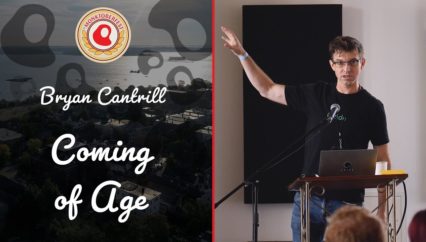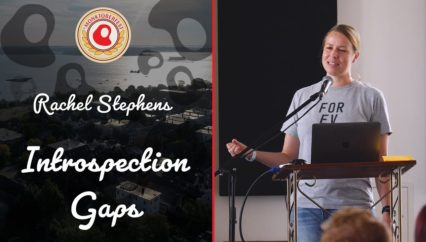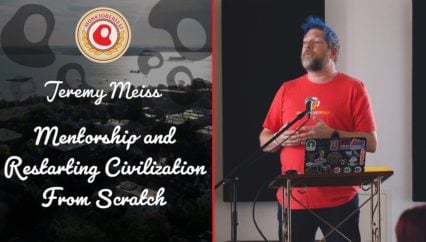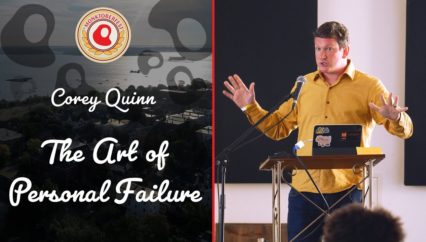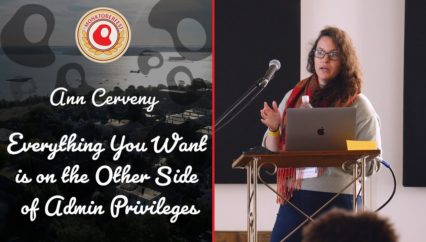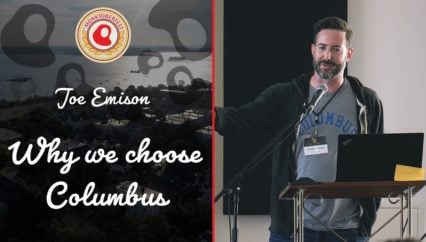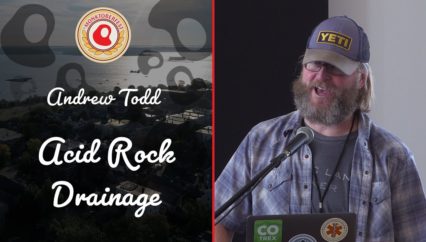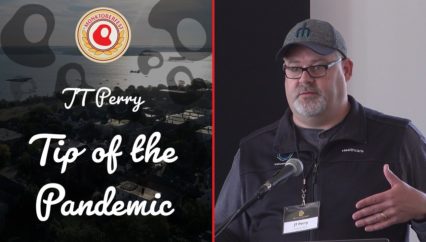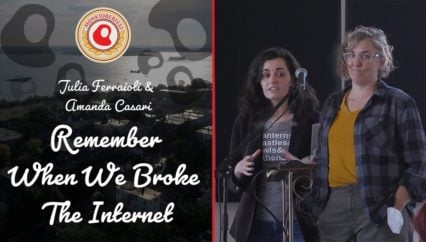In an era of rampant burnout, whether driven by the pressures of a global pandemic or just general overwork, self care is incredibly important. And while most of us want to say “yes” at work in a desire to be helpful and a team player, sometimes you need to say “no.” This talk touches on the obvious and not so obvious red flags, and helps facilitate conversations with managers and peers about how to saying no. You don’t need to have burnout on the horizon for this to be an effective tactic, and in fact the ultimate goal of this talk is to prevent burnout from ever happening in the first place.
Transcript
Cool. Hi, everyone!, what an exciting speaking slot after lunch! With technical issues, and I’m on my hotspot and hopefully it doesn’t disconnect, but we’ll see. This microphone is also very close to my face.
Hi. My name is Amara Graham. I’m super-excited to talk to you today. I heard another speaker that mentioned that this is a bucket list conference for them. Same! So I’m super-excited to be here and this is the first talk that I’ve ever done where I’m talking about my feelings, which seems very, very strange, like, I would much rather stand up here and give you like a tech demo, because if it fails, we’re all like, oh, that’s how tech demos go, but if I fail at describing my feelings, I don’t know what that says about me. So anyway, I want to talk about my year of no. And for the folks who know me, this might be polar opposite to our interactions and I’ll talk a little bit more about that. We can go on this journey together and get to know each other and I can talk a little bit more about how this is kind of the opposite of who I am, but gave me a really great opportunity to learn more about myself, learn more about the places and spaces that enable me to thrive, and hopefully inspire you to do the same.
Cool, and it didn’t freeze this time.
So again, this talk is going to be about my feelings and I wanted to kind of put up this disclaimer to say that this happened years ago, this is actually like coming from a pre-pandemic situation, so this is the first talk that I’m sharing my feelings, like I mentioned, and this is the first time that I’ve talked about this publicly, so there are some people in the room that would potentially be able to connect the dots and be like, ooh, I know you’re a manager, I know your employer, I know this, I know that. I don’t care, but I would ask on that you kind of focus on what I’m delivering rather than connect those dots because at the end, I have grown from it, I have moved on, and I would like to share that experience, rather than have you connect all those dots, so please do me that favor.
All right. So again, very different than a tech talk, I’m going to introduce myself through a bunch of photos, none of which are work related, other than the emojis.
So let me take you back to 2018, again, prepandemic, wild, 2018 was for me an incredible year in my personal and professional life. I was an individual contributor, developer advocate, I was looking for pretty much anywhere and everywhere where people could use AI service toss make their lives easier, make kind of lift them from having that burden of trying to figure out what is AI. I was getting married without a wedding coordinator, which, anyone who’s had that experience knows, it’s a lot, and then we decided to move across a few timezones, so now we were having what kind of felt like a remote-planned wedding, which I’d probably be really good at now, but I was not so good at back then.
So we’re doing that. We’re also coordinating a cross-country move with were my cat in the bag down there. Shoving him in a bag was just a no-go for him. And throughout this entire year, I had convinced myself that I was capable of doing anything and everything that came my way, and I had no evidence to believe that I couldn’t do that. I did everything, and I did everything in a way that I was impressed with myself. Other people were impressed, they were like, how are you doing all these things? So some of the pictures up here, my lovely partner and husband, JJ, I was introducing him to Texas bluebonnets all the time. He’s actually from the other Portland, which is really weird. I keep saying I’m from Portland, he keeps saying, “not the right Portland”
So introducing him to Texas, keeping up with work as I’m moving from San Francisco to Austin, Texas, getting married in Oregon, building a house in Austin, all of that stuff is happening while I’m also going to conferences, traveling, all that kind of stuff. But the real kicker is while I’m feeling all these super-human of look at all the things I can do, I’m unstoppable. I kind of finished the year with my first international speaking engagement, which I was like, oh, my gosh, to get this opportunity to speak at this conference, so awesome, I finish my talk and I walk offstage that instead of my coworkers talking about this opportunity I had and celebrating that I was able to do this, they proceeded to have a discussion about how I was clearly ungrateful because I was wearing the thin, flimsy cotton t-shirt with my company’s logo on it and instead, wore a sweater dress made by a particular designer that I find very empowering and inspiring when I wanted to look nice on stage. So I go back to my hotel, have a good cry, because that was what the year was, it was high highs, low lows, and I had people saying, well, she didn’t wear right clothing to the event.
Maybe I should say that I shouldn’t repeat that year, because again, felt unstoppable, kind of bringing some of that energy into this year, but then also in the back of my mind, or maybe not in the back of my mind, hearing those coworkers who were like, you’re doing a lot, but you’re not doing wrong. I realized there was a fundamental mismatch between my career goals and organizational priorities, things like, I had a kickass year, but I wasn’t promoted and this was one of those things where I was like, well, if I didn’t get promoted this year, when I had a rockstar year and I had people telling me that, something has to change, because I don’t understand what else I could do to gain that promotion.
But that wasn’t the biggest problem. I didn’t really care so much that I wasn’t promoted. The bigger problem was, I wasn’t even personally acknowledged for the work that I did. So at the company that I was at, at the time, there was this big company initiative and like I said, I’m not going to go into details, because we don’t need to have a finger-pointing exercise, but what I really would have appreciated is someone saying hey, when you were working every working hour for X amount of hours, we really appreciate that, thank you so much for your hard work, I got a “good job, team, thanks, fam! We did it!” and I was like, “the fuck?”
Nowhere did I hear my name, nowhere did I hear any of my other team who helped me pull this off. There were really two people who were in charge of that initiative and they were the ones that were getting the kudos, they were the ones that were getting the you, insert name here, did a great job at this. The rest of us were kind of along for the ride. Because to be promoted at this company, like many other companies, you need to own a something, not just do a something, you need to be known for a something. And at that point I was known for doing the work. Which is fine, unless you’re looking for something like a promotion, and that is not promotion-worthy.
So I collected my “great job, fam,” and decided that I needed to make a change and sat down and tried to figure out what that change was going to look like, but I knew I couldn’t repeat the year that I had just had.
So insert this book. Has anyone read this book? Oh, my gosh, one person, two, three, kind of, ooh, hands are going up. So I read Shonda Rhimes’ “Year of Yes.”I really enjoy nonfiction but I’m not really into self-help kind of books, which this book kinds of skirts that line. I’m more into biographies and memoirs, because it helps me think how people think or give me that glimpse into someone’s life that isn’t mine. So maybe you can see where this is going. Or maybe not, who knows.
So for those of you who may not know who Shonda Rhimes is. Maybe you recognize this logo, or you know Shondaland from the different series that she has. I really only read this book because I was a fan of the TV shows, so it was things like Grey’s Anatomy, these big universes that Shonda Rhimes had crafted. Like, certainly someone who was going to craft this fantastic fictional space and go through such a tremendous depth to do so, she’s got her life together, right? I’m gonna learn from that. In more recent years you may have seen it introduced through Peloton, she did a collaboration with them, doing a year of yes. And this is where it crept into that self-help kind of things, so you may be more familiar with this brand. Despite being a Peloton user, I didn’t catch onto this, which I think is kind of funny, but without spoiling the book or providing some kind of book review, because that’s not what I’m going to do. Shonda Rhimes is an introvert, so saying yes doesn’t come naturally to her. More recently I’ve described myself as an ambivert, which I think is a good indication. If you saw me on the cruise last night or as I was leaving, I was like, I’m done with people, I need to go home. I love all of you, you are really great people, I’ve just reached my limit and I’m done and I know that about myself. So again, I’m an ambivert, but I am an extrovert out of self-preservation, which is a whole other talk.
So going back to Shonda here, Shonda defaults to no, she’s busy, she’d rather be by herself and kind of those other things that we all associate with someone who is introverted or someone who defaults to not but a powerful moment in the book for me is when she describes saying yes to saying no.
Saying yes, for me, is super-easy, but could I learn to say yes to say no?
So maybe you do know where this is going at this point.
So I realized the best thing I could do for myself was learn how to say yes to say no. Say no outside of everything for my goals for the year. This wasn’t going to be easy. But it was going to be necessary to prevent the kind of burnout that makes you leave tech entirely. Like, total complete career change if I don’t get this under control.
I knew that this was what I needed to do, but I wasn’t exactly sure how I was going to communicate it. This wasn’t about my goals being better than anyone else’s. This was truly about burnout prevention and preventive healing and again, I needed to figure out how to package that in such a way that people understood that, rather than me just saying no to everyone and kind of trying to live in my own bubble.
So I mentioned that I’m the person who, like, gets things done, right? So immediately I’m like, how would this impact my personal brand. If I’m always the person people go to for help, if I’m always the person people go to to get things done, what happens when I start telling them no? So for someone like me, I’m a team player, I’m a go-getter, I’m Type A, it had this potential to be detrimental to my career relationships but also to my mental health to take a drastic turn in the other direction. Saying yes was my comfort zone, so how could I go from being the person who always said yes, always saved the day, always got the job done, to the person who more than likely said no?
Like Shonda, I needed to be my own person, and pave a path forward inspired by saying no.
And one of the things that I wanted to mention particularly to this group is burnout shouldn’t be the only trigger that you need to make a change. I think that’s the most abrupt or most obvious one to folks.
But growing up, my dad would say things like, everything in moderation, and a bit like a mantra, and I wasn’t living this. Like I mentioned earlier, there were times where I spent every waking hour on the phone, on the computer, trying to get things done, trying to make sure that we were able to meet those deadlines. I wasn’t living the everything-in-moderation that I needed to, and I needed that hard reset. So in a sense, burnout did that for me. It showed me that I needed that hard reset. I know that there’s things that changed since then, so like burnout has made it into our mainstream lexicon, it doesn’t make it easier to spot or avoid or even cope with, but I am very happy to hear that more people are talking about t recognizing it, figuring out ways and tools to help people through it.
But I do also want to mention that I didn’t just need like a bubble bath to make myself happy, like, it wasn’t like, new year, new me, let’s have a bubble bath and solve all of this. Like, no.
[laughter]
So was I going to be able to pull this off? This was one of the things that I thought through quite a bit before I even approached my manager and said, you know, I need some help here.
I’d previously worked at Intel and Intel talks about career progression or performance as you know, you own your own career. And as a recently graduated college student, I am looking at that, going, you own your own career, what does that mean? Like, I don’t know what to do with that.
But as I’ve gotten more experience, I’ve realized it’s more about advocating for yourself and your decisions and that’s what I needed to do. I needed to set it up or package it in such a way that I was advocating for myself and my own career decisions, but I realized that it’s pretty ridiculous that as a Developer Advocate, I was having trouble advocating for myself. So would I be able to do this? Of course and I’d be able to use some of those same tactics that I used for Developer Advocacy.
So this is where I had give you some of the tools to be successful or to navigate this if you or someone you know is going through this. My biggest thing is you need to gain support from your manager and if you cannot gain support from your manager, I would encourage you to leave your manager, and part of that is you can’t do this alone, it’s not something that you can but I truly believe not being able to gain support from your manager is one of the more subtle signs much a toxic environment. You are going to receive push-back and you are going to need support and if you don’t have that support from your manager, it is the Everest that you will never be able to summit.
The other thing that I would encourage people to do is tell everyone what you’re doing early and often. I’m sure my coworkers, particularly my teammates thought I was nuts, because I was like, I’m going to tell everyone no, don’t tell them to come and ask me to do this, because the answer is no, and they’re like, we get it, you’ve told us this a billion times and I’m like, no, but I want you to support me. If they come up to you and say oh, — back her up and don’t say, oh, if you asked her a second time, maybe she’d say yes and be like, no, the answer is no.
Tell everyone what you’re doing early and often. When somebody asks how are you helping with the company initiative this year, I simply said I’m not and I wasn’t the only person who wasn’t helping out with the company initiative. They were other people, they were just less vocal about it.
And typically when I told people, hey, it doesn’t provide the opportunities to support my career goals, they get it. It takes them a little bit of a while but they eventually understand what’s going on there. And again, your coworkers are going to be able to be enabled to support you are and empower you. So the more career conversations you have with them, you help them understand that you’re maybe working on a separate program, you’re doing an R & D project or something that has your full devotion, people understand that you’re not always going to say yes to everything or be involved with everything and setting those expectations is super-important.
So establishing goals and boundaries kind of along the way is also helpful in communicating what is happening here.
It’s really setting up everyone else for success with you, because again, there are going to be some things where you need to lean on other people, there are going to be projects where you’re going to be involved with other people, but every opportunity and every time someone says, ooh, can you work on this, you don’t have to say yes.
Particularly in the AI space, this for me meant communicating to other people that I was available to do AI advocacy for military use cases and this was particularly important when I started working on game engines or game development, where I was not interested in helping people build solutions to, like, draw out trajectories for weapons, that was not something that I was interested in. If somebody else wanted to do that, I’m not going to stop them, but that was one of the clear lines that I wanted to draw, to say I am not interested in enabling someone to do that.
This also meant and this sounds wild to say out loud, this also meant communicating to saying that just because I didn’t have kids didn’t mean I could work 24/7.
[applause].
Big shocker there. I did not understand entering industry, because it started very early, that people had this understanding that if I wasn’t married, didn’t have kids, all of these other things, that I could answer the phone any hour of the day. I was willing to help and do anything. And I just couldn’t believe it. So when I said I was going offline, I meant it, and I encouraged my coworkers to do the same thing, because they didn’t always get the comments that I did, but every once in a while I had to remind people that kids aren’t the only reason you should be offline in the evening hours and the weekends.
As a manager, like I am now, you should also be encouraging people to communicate, to set up goals, to set up boundaries, and you should remind everyone, including yourself that everything can’t be a top priority. If everything is a top priority, then there are no priorities. It’s an indication that if you can’t recognize the priorities, or if there are no priorities, how are you going to help your reports to do that, as well?
So again, as I’m kind of thinking about how do I use that experience that I had for good, I’m now thinking of it in terms of how do I help my reports recognize when priorities have changed, when there are no priorities, or when there are too many competing priorities, to help them grow in their career goals and help them understand what boundaries they can set, as well —
This is like the shakiest podium.
So avoiding traps. Ooh, this one was a really hard slide to pull together, because I could rant and I’m not going to do that … Too much?
So I actually had other managers come to me and my manager and said that I had to contribute, because everyone else was. And that was false. I could name and I could ask, what is this person doing, what is that person doing? Oh, no, no, they’re working on something different, they’re working on something special. Well, why can’t I do that? My skills aren’t particularly relevant to this area. There’s no reason that I need to do this. Why are you asking me and not these other people?
Another really interesting moment happened where — and it still happens to this day, actually, it happened a couple of weeks ago, where someone said, I can’t believe you said no to a senior manager, a senior manager, C-suite, whoever it was, but the question was, Amara, can you get on a plane in Austin and fly to Rhode Island in 6 hours, we can book it, we can get you out the door, because we have a very high priority customer that we need you to meet with.
Did this customer just wake up this morning and say we need an AI Developer Advocate from this company? blah, blah, blah? Like, what happened? The stories shifted over the day when these emails were coming in, can you do this? No, can you do this? No. They had asked everyone on one team, they were busy. They had asked other people, they were all busy, so really I was the last resort so when I said no, it wasn’t no, I Amara cannot do it, turned out we cannot support this very high priority customer and the very last email I sent that I sent no, I cannot go, this is an unreasonable request. I said if no one else can go, this must not be an important customer. How can you say that, because it was unreasonable that no one else had to go to this important high priority customer and they could continue to do their business? Ridiculous.
So I put together this lovely thing, because I didn’t want to go through all the stories on here, but saying no doesn’t support a growth mindset is absolutely ridiculous, because if you do everything and you say yes all the time, you will never have an opportunity to grow in the way that you want to. It will be in the way that everybody else wants you to grow and that might not be the best way. Boundaries support healthy growth opportunities and don’t let anyone tell you otherwise, but everyone needs to focus on that.
We talked about this at length. That’s not always true. Who else is going to work on this, or this has to get done. This is my favorite one, because it very clearly told me who was on my side and who was supporting me, and who was upset because they were going to have to do the job themselves.
Sorry, but I’m not here to do my job and everyone else’s, and I clearly feel that guilt-driven productivity cultivates burnout.
[applause]
So how would this impact my personal brand? Didn’t. I still get shit done. My coworkers became more thoughtful about their requests for my time and energy, and it was fascinating to watch them ask each other in a more thoughtful way, as well.
When I reached out for help or with opportunities, I always packaged them in a way that communicated the value to both them and me, so again I was still asking people for help, they were still asking me for help, but it was packaged in such a way that everyone benefited from it or they knew that without extensive investigation and extensive understanding of what needed to happen before we started that work.
It also helped me recognize when to encourage and support others in saying no.
So I’ve shifted how I offer opportunities or how I ask for help in saying, you can always say no. So if I need someone to help me with like an interview process, they need to be on a panel, I let them know: Hey, you are my person that I need in this particular position for this interview panel, but if you are too busy, you have an out. You can say no, and people are super-thankful for that. I’m like, that’s very easy for me to be like, you can say no, because I can ask other people. There are other people.
So some takeaways for you. I think it’s really important to acknowledge that always say yes or always saying no isn’t always the best thing to do, but it does prepare you to make really solid decisions based on other people’s responses and this is maybe the biggest thing that I learned in this journey.
So I have a couple of things here. One I think is maybe the biggest takeaway is stop doing thankless work, duh!! Or on the flip side of that, remember to say thank you, then it’s not thankless work.
Consider a year of no, like I did. Which I will admit was incredibly hard. But on the flip side of that, if you’re feeling stuck or uninspired, go Shonda’s route, and do a year of yes and see if that’s what you need.
Or maybe you need some moderation and that’s fine too.
Create those goals and boundaries, and then never stop communicating. If you commune indicate your goals and boundaries, you’re setting those expectations with other people, and they can help you, because whether we’re in our careers or at home, we’re not on this journey through life by ourselves. So if you’re not communicating these things, people will just not know. And with that, thank you.
[cheering and applause]
